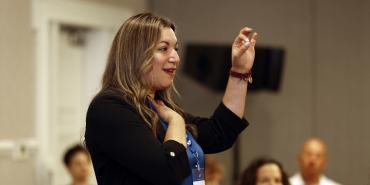Educators crowded into a transformative session at the AFT TEACH conference on Saturday: “This Is Your Brain on Stress,” led by Jen Rafferty, founder of Empowered Educator. With humor and candor, Rafferty delivered practical tools and insights aimed at helping educators reclaim control over their emotional well-being—both inside and outside the classroom.
“I’m here because I am tired of our educational systems perpetuating stress for our kids,” said Rafferty. “They’re learning what it means to live in a state of overwhelm, burnout and exhaustion—and we, the adults guiding them, often don’t have the tools to navigate it ourselves.”
In a fast-paced, interactive workshop that had attendees moving, breathing and reflecting, Rafferty challenged educators to rethink how they show up in their classrooms and in their lives.
“Organizations don’t change until people change. … The only person you have agency to change is yourself. Your agency is how you are going to meet the moment,” said Rafferty. “As educators, you can’t let your stress be in the driver’s seat.”
Participants were guided through techniques to regulate their nervous systems—starting with identifying their own stress triggers and how those stressors physically manifest. From breathing exercises and mindful movement to simple acts like taking breaks and honoring basic biological needs, Rafferty made the case for everyday practices that disrupt stress before it turns into burnout.
“These strategies are essential for you to change. Do these things to interrupt your day… . If you’re not interrupting your day, nothing will change for you,” she said.
Rafferty urged educators to reconnect with their sense of worth, noting the importance of modeling self-respect for students. “If we want our students to understand their self-worth, we have to know ours,” she said. “Respect starts with the little things—like eating when you’re hungry, going to the bathroom when you need to and saying, ‘I need a minute.’ That’s empowerment.”
She also touched on the science behind stress, explaining that the human brain is a prediction machine wired to stay in the realm of what’s probable. “But probable keeps us small,” she said. “It keeps us from imagining what’s possible.”
Possibility, she explained, begins with internal alignment: syncing thoughts, beliefs, language and actions. “This is how you become resilient. You rehearse your responses to stress. You connect with your body,” she said. Understanding how your brain works offers “the keys to the kingdom, because when you start to process your emotions—regulate your nervous system—then you make choices about how you want to live your life,” Rafferty said as the session ended. “That is living by design and making your impact.”
[Adrienne Coles]


